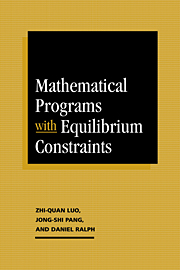4 - Verification of MPEC Hypotheses
Published online by Cambridge University Press: 05 December 2011
Summary
In Section 3.3, we have introduced the full, extreme, and basic CQs for an MPEC. Under any one of these CQs, stationarity of a feasible solution to an MPEC can be characterized; see Corollary 3.3.1, Theorem 3.3.4, and Remark 3.3.5. In this chapter, we consider some important cases of the general MPEC (3.1.1) and introduce certain assumptions in order to verify such CQs, thus completing the task of deriving first-order optimality conditions for the MPEC.
This chapter has four main sections. Section 4.1 considers the AVI constrained mathematical program, i.e., the MPAEC. The main goal of this section is to demonstrate that the extreme CQ must hold without any particular assumptions. This conclusion is consistent with a standard nonlinear program with linear constraints for which the KKT conditions must be necessary for local optimality. The next two sections, 4.2 and 4.3, discuss two general approaches to deal with the MP with nonlinear VI constraints. The approach in Section 4.2 is of interest because of the bilevel nature of the MPEC and the special significance of the variables x and y, whereas the approach in Section 4.3 is more along the line of traditional nonlinear programming, but with an important modification to deal with the combinatorial feature of the MPEC. The chapter concludes with a discussion of an exact penalization of order 1, using the assumptions set forth in Section 4.2.
The two approaches discussed in Sections 4.2 and 4.3 together provide a powerful tool for the study of the MPEC. They are based on different assumptions and are therefore applicable to different classes of MPECs.
- Type
- Chapter
- Information
- Mathematical Programs with Equilibrium Constraints , pp. 145 - 222Publisher: Cambridge University PressPrint publication year: 1996



